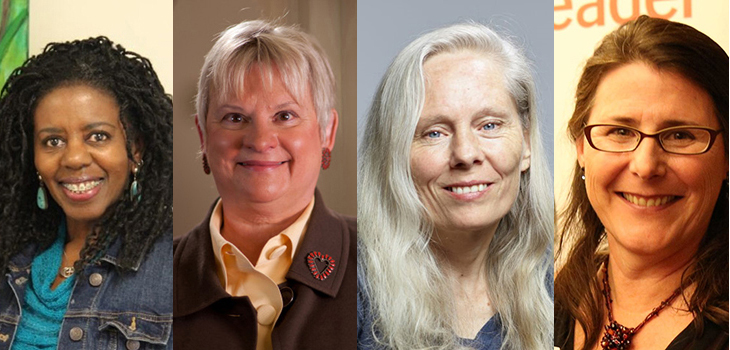Pictured L to R: Safi Jiroh, Mary Lou Goeke, Judith Smith, and Molly Wertz
On Thursday, July 11, LeaderSpring Center held an informational webinar for the What’s Next: Leading a Thriving Transition program, which it runs in partnership with TSNE.
What’s Next is a cohort-based program that supports long-time leaders in preparing their organizations and themselves for a leadership transition. It provides participants with two retreats, personalized coaching, and access to a network of former What’s Next participants.
The webinar provided an overview of the program by LeaderSpring Center’s Deputy Director Safi Jiroh, and featured personal stories and advice from three What’s Next alumnae who have successfully transitioned out of their organizations.
FROM OUR ALUMNAE
Mary Lou Goeke, former CEO of United Way of Santa Cruz County
“I have highly recommended the What’s Next program to anyone even thinking about transition. The dual pathway of preparing my organization and myself personally for this big life change was really meaningful and helpful. The precious days of reflection with colleagues [at the retreats] was priceless.”
Advice: “Do some self-assessment and know where you think you’ll need more help in your transition so you can get the most out of the coaches and your cohort.”
Judith Smith, former Artistic and Executive Director of AXIS Dance Company
“I struggled with leaving my position because there are so few disabled leaders out there. My What’s Next coach was really important to me as I worked to groom another disabled leader to take my place.”
Advice: “Do it sooner rather than later. When I signed up for the program, I had hoped to give two to five more years at my organization, but my burn out was real and immediate. If I had participated sooner, I would have had more time and energy to give the transition process.”
Molly Wertz, Founder and former Executive Director of Tandem
“Because I was a founder, many people — my board, community, and funders — had a perception that I was the lynchpin of the organization. Since the program was for people thinking about leaving in five years, it made the entire process more palatable to them.”
Advice: “I went down to four days a week and made them “no contact days” so my staff could get used to me not being there and make decisions without me. It also gave me an opportunity to enroll in a class so I could explore new things and spark my interest so I would transition to retirement with something new to be excited about.”
Watch a recording of the webinar
Inquire About the Program
Learn more about the program and inquire confidentially today.
